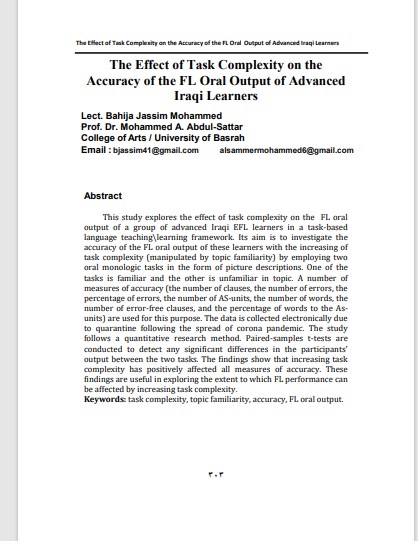تأثير تعقيد المهام على دقة النتاج الشفوي لمتعلمي اللغة الانكليزية العراقيين المتقدمين بوصفها لغة أجنبية
محتوى المقالة الرئيسي
الملخص
تبحث هذه الدراسة في معرفة تأثير تعقيد المهام على النتاج الشفوي وبالتحديد دقته لمتعلمي اللغة الانجليزية على المستوى الجامعي حيث استخدمت الدراسة مهمتين مختلفتين: المهمة الأولى ذات موضوع مألوف للمتعلمين المذكورين والثانية ذات موضوع غير مألوف لهم.ومن اجل معرفة دقة النتاج تم عرض مجموعة من الصور لكل موضوع بواسطة Zoom meetings والطلب من كل متعلم في العينة وصف الصور باللغة الانجليزية. وقد تم الاعتماد على عدد من المقاييس للبيانات التي تم تجميعها الكترونيا بسبب الحظر الوبائي وتحليل النتائج إحصائيا بواسطة t-test للتوصل إلى أن تعقيد المهام متمثلا بعدم ألإلمام بالموضوع قد سبب فروقا معنوية بين المهمتين حيث أن المهمة الأكثر صعوبة كانت أكثر دقة في الأداء وفقا لعدد الجمل وعدد الوحدات وعدد الأخطاء ونسبتها وعدد الجمل التي تخلو من الأخطاء وعدد الكلمات ونسبتها إلى وحدات تحليل الكلام. وهذه النتائج تكشف مدى تأثر النتاج الشفوي بتعقيد المهام.
تفاصيل المقالة

هذا العمل مرخص بموجب Creative Commons Attribution-ShareAlike 4.0 International License.
المراجع
Abdul Imam, A. and Abid, R. A.S. (2011). "The Effect of Topic
Familiarity on EFL Reading Comprehension", Adab Al-Basrah. (56),
-95.
Awad, A. A., (2017). The Effects of Task Complexity Manipulated
by Intentional Reasoning Demands on Second Language Learners’
Speech Performance: Interaction with Language Proficiency and
Working Memory. Unpublished PhD Thesis: University Of
Reading.
Bui, H.Y.G. (2014). "Task Readiness: Theoretical Framework and
Empirical Evidence from Topic Familiarity, Strategic Planning, and
Proficiency Levels", in P. Skehan (ed.), Processing Perspective on
Task Performance. Amsterdam: John Benjamins. 63-94.
Bygate, M. (2001). Effects of Task Repetition on the Structure and Control
of Oral Language. In M. Bygate, P. Skehan & M. Swain (Eds.),
Researching Pedagogic Tasks: Second Language Learning,
Teaching and Testing. London: Longman. 23-48.
Candlin, C. (1987). "Towards Task-Based Language Learning", in Candlin, C.
and Murphy, D. (eds.), Language Learning Tasks. London: Prentice Hall.
-22.
Crespoo, M. R. (2011). The Effects of Task Complexity on L2 Oral Production
as Mediated by Differences in Working Memory Capacity. Unpublished
M.A. Thesis: University of Barcelona.
Crooks, G. (1986). Task Classification: A Cross-Disciplinary Review. Center for
Second Language Classroom Research, Social Science Research Institute,
University of Hawai at Manoa, USA.
Ellis, R.; Skehan, P.; Li, S. and Shintani, N. (2020). Task-Based Language
Teaching: Theory and Practice. Cambridge: Cambridge University Press.
Foster, P., Tonkyn, A., and Wigglesworth, G. (2000). "Measuring Spoken
Language: A Unit for all Reasons", Applied Linguistics. Vol. 21(3), 354-
Garret, M.F. (1975). "The Analysis of Sentence Production", in Bower, G. (ed.).
Psychology of Learning and Motivation. New York: Academic Press.
Available at: https://libgen.is/book/index.php?md5=F55F3FA7D6AE87655A9FA5E0F5933AE8. Retrieved on: 11/3/2022.
Gilabert, R. (2004). Task Complexity and L2 Narrative Oral Production.
Unpublished PhD Thesis. University of Barcelona.
Housen, A; Kuiken, F.; and Vedder I. (eds.)(2012). Dimensions of L2
Performance and Proficiency : Complexity, Accuracy and Fluency in
SLA. Amsterdam: John Benjamins.
Kormos, J. (2006). Speech Production and Second Language Learning.
Mahwah, NJ: Lawrence Erlbaum.
Lennon, P. (1991). "Error: Some Problems of Definition, Identification
and Distinction", Applied Linguistics. Vol. 12, 180-195.
Levelt, W. (1989). Speaking: From Intention to Articulation. Cambridge MA:
MIT Press.
Levkina, M., and Gilabert, R. (2012). "The Effects of Task Complexity on
L2 Oral Production", in Housen A., Kuiken F., and Vedder I. (eds.),
Dimensions of L2 Performance and Proficiency: Complexity,
Accuracy and Fluency in SLA. Amsterdam: John Benjamins, 171–
Long, M.H. (1985). " A Role for Instruction in Second Language
Acquisition: Task-Based Language Training", in Hyltenstam K. and
Pienemann (eds.) Modelling and Assessing Second Language
Acquisition. Clevedon, Avon: Multilingual Matters.
__________ (2015). Second Language Acquisition and Task-Based
Language Teaching. Wiley Blackwell.
Long, M. H. and Crookes G. (1992). "Three Approaches to Task-Based
Syllabus Design". TESOL Quarterly, 26, 27–56.
Malicka, A. (2014). The Role of Task Complexity and Task Sequencing
in L2 Monologic Oral Production. PhD Thesis. University of
Barcelona.
Malicka, A., and Sasayama, S. (2017). The Importance of Learning from
Accumulated Knowledge: Findings from Research Synthesis on Task
Complexity. Paper Presented at the 7th International Task-Based
Language Teaching Conference. Barcelona.
Rahimpour, M. and Hazar, F. (2007). "Topic Familiarity Effect on
Accuracy, Complexity, and Fluency of L2 Oral Output". The Journal
of Asia TEFL, 4( 4), 191-211.
Richards, J.C., and Rodgers, T.S. (2001). Approaches and Methods in
Language Teaching, Second Edition. Cambridge: Cambridge
University Press.
Robinson, P. (2001a). "Task Complexity, Cognitive Resources, and Syllabus
Design: A Triadic Framework for Examining Task Influences on SLA", in
Robinson P. (ed.), Cognition and Second Language Instruction.
Cambridge: Cambridge University Press. 287-318.
________ (2001b). "Task Complexity, Task Difficulty, and Task
Production: Exploring Interactions in a Componential Framework".
Applied Linguistics, 22(1), 27–57.
__________(2007). "Criteria for Classifying and Sequencing Pedagogic
Tasks", in Garcia Mayo M. P. (ed.), Investigating Tasks in Formal
Language Learning. Clevedon, UK: Multilingual Matters. 7–27.
Robinson, P., and Gilabert, R. (2007). "Task Complexity, the Cognition
Hypothesis and Second Language Learning and Performance". IRAL,
(3). 161-284.
Samuda, V., and Bygate, M. (2008). Tasks in Second Language Learning.
Palgrave Macmillan.
Schmidt, R. (2001). "Attention", in Robinson, P. (ed.), Cognition and Second
Language Instruction. Cambridge: Cambridge University Press. 3-32.
Available at:
https://libgen.is/book/index.php?md5=0D79C0148585B1E47E2FF35B0DAD5315
Retrieved on: 3/4/2020.
Skehan, P. (1998). A Cognitive Approach to Language Learning. Oxford:
Oxford University Press.
________ (2014). "The Context for Researching a Processing Perspective on Task
Performance", in Skehan P. (ed.), Processing Perspectives on Task
Performance (Vol. 5, pp. 1-26). Amsterdam: John Benjamins.
Skehan, P., and Foster, P. (2001). "Cognition and Tasks", in Robinson P.
Cognition and Second Language Instruction. Cambridge: Cambridge
University Press. 183-205.
Tavakoli, P., and Skehan, P. (2005). " Strategic planning, Task structure, and
Performance Testing ", in Ellis R. (ed.), Planning and Task
Performance in a Second Language. Amsterdam: John
Benjamins. 239–273.
Willis, J. (1996). A Framework for Task-Based Learning. Harlow:
Longman.
Yaqoob, H. A. (2021). "The Relationship Between Critical Thinking and Iraqi
EFL Learners’ Productive Skills", Journal of Basra Researches for
Human Sciences. Vol. 46, (3),70-87.
